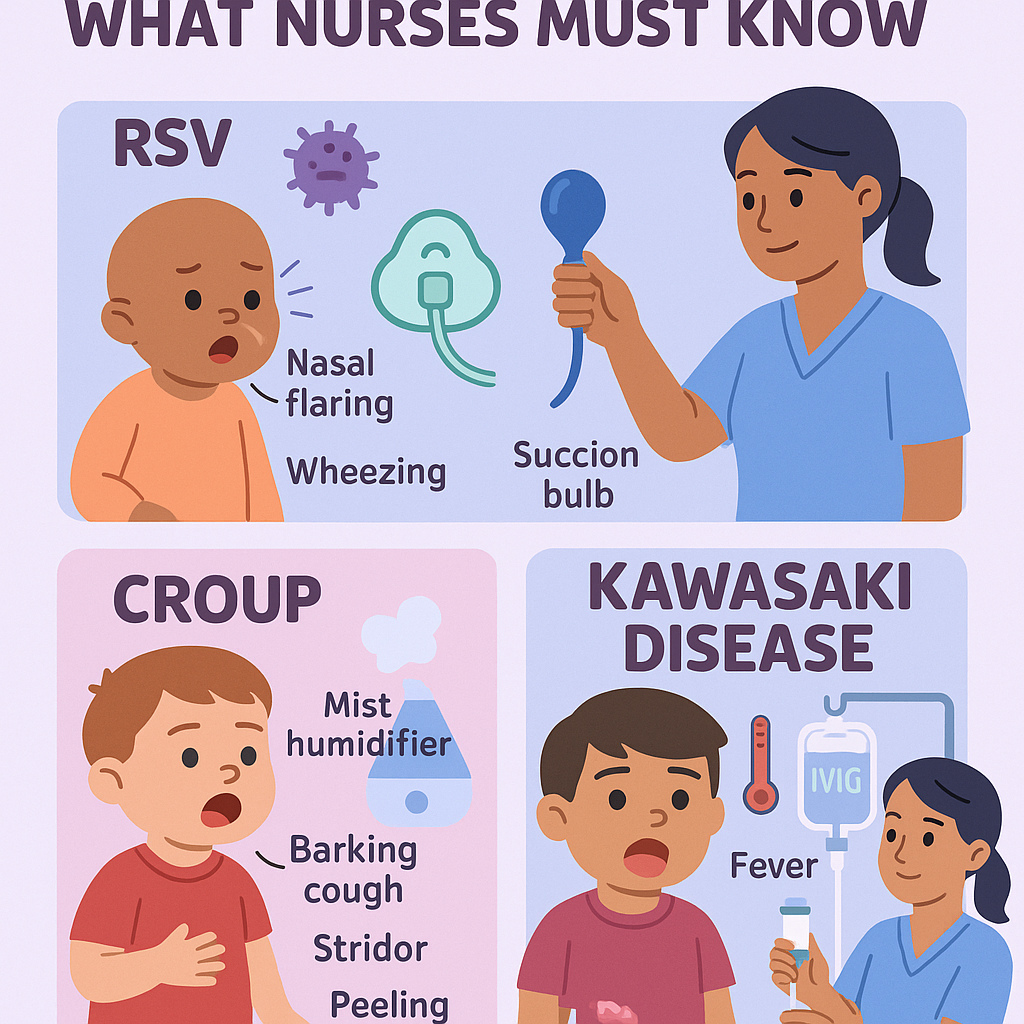👶 Why Nurses Must Know These Pediatric Conditions
As a registered nurse (RN) or nursing student preparing for the NCLEX, understanding common childhood illnesses is essential. Conditions like RSV, Croup, and Kawasaki Disease frequently appear in pediatric settings and NCLEX scenarios. Let’s break them down in simple, easy-to-remember steps that fit into your nursing bundle review.
🦠 RSV (Respiratory Syncytial Virus)
What Is RSV?
RSV is a highly contagious virus that infects the lungs and respiratory tract, especially in infants and toddlers under age 2.
Key NCLEX Facts:
- Peak season: Fall and Winter
- Risk groups: Premature babies, infants <6 months, immunocompromised children
Signs and Symptoms:
- Runny nose
- Coughing and wheezing
- Fever
- Poor feeding
- Nasal flaring and retractions (signs of distress)
- Apnea in very young infants
Nursing Priorities:
- Airway monitoring: Keep oxygen saturation ≥ 92%
- Suctioning: Clear nasal passages to improve breathing
- Hydration: Offer fluids or IV fluids if not drinking
- Isolation: Contact and droplet precautions
- Parent education: Teach signs of worsening breathing
💡 NCLEX Tip: RSV is viral — so antibiotics are not used unless there’s a secondary bacterial infection.
🗣️ Croup (Laryngotracheobronchitis)
What Is Croup?
Croup is a viral infection causing inflammation of the larynx, trachea, and bronchi, leading to a barking cough and noisy breathing.
Common Causes:
- Parainfluenza virus
- Peaks in fall and winter
Classic Signs:
- Barking seal-like cough
- Stridor (high-pitched sound on inhalation)
- Hoarseness
- Fever
- Symptoms often worsen at night
Nursing Interventions:
- Humidified air: Cool mist or steam
- Corticosteroids: (e.g., dexamethasone) to reduce airway swelling
- Epinephrine neb: For severe cases
- Calm the child: Crying worsens symptoms
🧠 NCLEX Tip: Don’t inspect the throat with a tongue depressor — this could trigger laryngospasm!
❤️ Kawasaki Disease
What Is Kawasaki Disease?
Kawasaki is a rare but serious illness that causes inflammation in blood vessels (vasculitis), mostly in children under 5. It’s the leading cause of acquired heart disease in kids.
The “CRASH and Burn” Mnemonic:
- Conjunctivitis (no pus)
- Rash (polymorphous)
- Adenopathy (cervical lymph nodes enlarged)
- Strawberry tongue (red, swollen)
- Hands and feet swelling/peeling
- Burn = Fever ≥ 5 days
Major NCLEX Concern:
- Coronary artery aneurysms
Nursing Priorities:
- High-dose IVIG and aspirin therapy
- Monitor vital signs, especially heart rate and rhythm
- Educate parents: Watch for irritability, fever recurrence, or chest pain
- Echo monitoring during recovery
💡 RN Nurse Tip: Kawasaki’s treatment involves aspirin, which is generally avoided in kids — this is an NCLEX exception due to cardiac risks.
👩⚕️ Nurse’s Cheat Sheet: Quick Comparison Table
| Condition | Key Symptom | Treatment | NCLEX Alert |
|---|---|---|---|
| RSV | Wheezing, nasal flaring | Suctioning, fluids, oxygen | Don’t use antibiotics |
| Croup | Barking cough, stridor | Steroids, mist, epinephrine nebs | Avoid throat exam |
| Kawasaki | Fever + 4 other signs | IVIG + Aspirin | Watch for heart complications |
👩🏫 Why This Matters for NCLEX and Nursing Practice
Whether you’re a nursing student, RN nurse, or working through your nursing education bundle, knowing how to recognize and treat these illnesses is essential.
- They show up frequently in pediatric rotations
- They are part of NCLEX-style multiple-choice questions
- They require clear communication with parents and families
Understanding these three illnesses also improves patient safety and ensures early intervention, which leads to better outcomes for patients and their families.
✅ Final Tips for NCLEX Prep
- Use mnemonics like “CRASH and Burn” for Kawasaki
- Prioritize airway and hydration for RSV and Croup
- Know when to isolate and when to use contact/droplet precautions
- Review your pediatric nursing flashcards or nursing bundle materials before exams
🔍 Summary
RSV, Croup, and Kawasaki Disease are pediatric illnesses that every registered nurse should be able to identify quickly. By understanding the symptoms, knowing the treatments, and being aware of potential complications, you’ll be ready to ace the NCLEX and provide safe, effective care.

